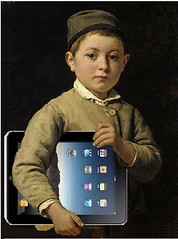 By now, it might not even be newsworthy when a school district announces it's buying a bunch of iPads for students. But last spring, when the Maine's Auburn School District announced that it was implementing a one-to-one program with the devices, the news did stir some controversy, spurred in part by Superintendent Tom Morrill's comments that an iPad is "even more important than a book." The other aspect that raised eyebrows: the students getting iPads were kindergarteners -- one iPad for each of the 250+ kindergarteners in the district.
By now, it might not even be newsworthy when a school district announces it's buying a bunch of iPads for students. But last spring, when the Maine's Auburn School District announced that it was implementing a one-to-one program with the devices, the news did stir some controversy, spurred in part by Superintendent Tom Morrill's comments that an iPad is "even more important than a book." The other aspect that raised eyebrows: the students getting iPads were kindergarteners -- one iPad for each of the 250+ kindergarteners in the district.
The school year is now almost halfway over, and the early results are in from the district's implementation. The results are good too: iPads increased the kindergarteners' literacy scores.
That's the money quote, I suppose, or the headline that I should have utilized -- the one piece of data that some folks are going to take and run with: iPads increased the kindergarteners' literacy scores.
Part of Maine's Ongoing Literacy and 1:1 Initiatives
But as Damian Bebell, one of the project's researchers argues, we can't just act as though the devices "arrive on parachutes" into a classroom and suddenly and magically students perform better. "It's really about pedagogy and teaching," says Bebell. The iPads are "just a tool."
They're a new tool in the arsenal of the Auburn School District's kindergarten teachers, for sure, but the district has been working for a number of years on improving its early literacy efforts. That has involved extensive training for the teachers and staff. It also means there's several years worth of data in how well kindergarteners in Auburn have read and written -- important when it comes to ascertaining how much impact these iPads actually make in the short- and long-term.
It's also noteworthy, says Bebell, that this very much was the district pushing the iPad implementation so as to boost literacy initiatives already underway. "This didn't come from Apple. This didn't come from the state commissioner of education," he says. This wasn't just a matter of implementing a one-to-one iPad program with little planning or objectives in order to tap into the latest ed-tech hardware craze.
Of course, Maine has a long history of one-to-one laptop initiatives, as the state was one of the very first to put computers into the hands of every seventh and eighth grader (way back in 2002). As such, Maine educators know what it means -- technologically and pedagogically -- to do one-to-one computing. Nevertheless, this is the nation's first public school district to give every kindergartener an iPad. And the iPad implementation in Auburn was done very carefully, with the research component built in from the start, not added as an after-thought, says Mike Muir, another researcher in the project.
Research Design from the Beginning, Measuring for the Long-Term
This fall, the district randomly selected 8 of its 16 kindergarten classes to receive iPads. There's been ongoing professional development to help the teachers incorporate the devices into literacy instruction (the PD has included all kindergarten teachers and specialists in the district, not just the ones in the first batch of classes to receive iPads). In December, iPads were rolled out to the rest of the classes. Assessments of all students' literacy were made at the beginning of the year and again in December. The initial assessments and research has focused on literacy skills, but the researchers are also looking at how iPads might affect numeracy skills as well.
Of the assessments that were made, the results all trended positive, with students in the group that received iPads at the beginning of the school year performing better on average than students in the comparison group. However, the differences between these two groups were not statistically significant, except in one area. That is, students with the iPads exhibited a substantial increase in their scores on the Hearing and Recording Sounds in Words (HWSIW) test, a test of a student's phonetical awareness, assessing their ability to make the sound and letter connection. (Research results PDF)
Systemic Change (versus "iPads Simply Change Everything!")
Was this a result of the device? The apps? The instruction? The professional development? Muir, Bebell, and fellow researcher Sue Dorris (a principal at one of the elementary schools) wouldn't say. Or rather, they insisted that the improvements were part of a systemic effort that the Auburn School District has undertaken to boost students' literacy. It's also part of a larger effort, says Muir, to create schools that motivate kids to learn. Of course, there's plenty of anecdotal evidence that iPads make kids more excited to do so, but these researchers are looking for more than that and believe they've got solid research and data.
The group will continue its research throughout the school year, and as these are the Auburn School District's earliest students, it will be interesting to watch what effect, if any, iPads have on students' long-term academic performance.
Photo credits: Mike Licht